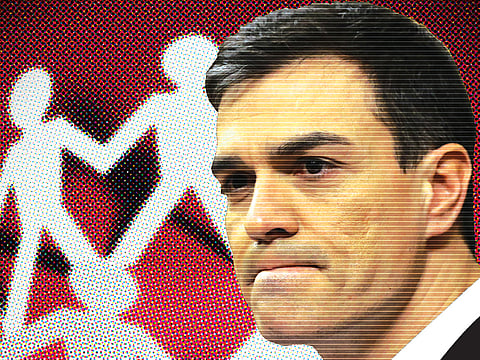Why Spain’s Pedro Sanchez needs a big dose of support
For the new prime minister, winning power in Madrid is one thing, but keeping it is quite another — come an inevitable general election

The new prime minister of Spain is a man who leads a nation divided and a parliament divided. And Pedro Sanchez is doing everything in his power right now to try and make sure he has the best chance of winning a general election that he will likely call in September or October at the latest. And if he hasn’t found the courage to dissolve the Madrid parliament by then, his hand will be very likely forced by the numbers there.
Right now, following his success in engineering a no-confidence vote that toppled former prime minister Mariano Rajoy on June 1, the 46-year-old economist and former basketball player leads Europe’s fifth-largest economy from a position of weakness. His Socialist PSOE party has just 84 seats in the 350-seat Congress of Deputies. Sanchez’s trouble for now is that he has few allies in the house, and when it comes to facing the electorate, he’s not that popular either. Twice, in elections in 2015 and 2016, he failed to make headway in the electorate, with any chance for growth being snuffed out by Spaniards turning to the left-wing Podemos (We Can) party instead.
Spain’s Constitution states that if a party proposing a no-confidence motion wins the vote, it must then be prepared to rule as long as it has a majority. That’s the catch for Sanchez. He had enough support to topple Rajoy, but now hasn’t enough to effectively rule.
And as it stands now, Podemos will be eager to benefit again from any new election that Sanchez will contest.
Yes, Podemos backed Sanchez in the no-confidence vote to topple Rajoy, but that’s as far as it goes when it comes to supporting the prime minister and the socialists. What’s more, the Cuidananos party had backed Rajoy, and it wants an election. The Basques are not inclined to support the collapse of the government for now — they managed to win major concessions on infrastructure and regional funding in the federal budget from Rajoy before he was toppled, and Sanchez pledged to honour that financial commitment in return for the Basques’ help in toppling Rajoy.
And then there are the Catalonians.
For the past nine months, Spain has been ripped apart by demands from Catalan separatists for independence. That referendum last October resulted in a flawed mandate for an independent homeland, a subsequent declaration of sovereignty, direct rule from Madrid and the jailing of separatist leaders all against the backdrop of new regional elections there that returned the regional power players as before.
As it stands now, 25 Catalan leaders are due to be tried for rebellion, embezzlement or disobeying the Spanish state by going ahead with the October referendum. If convicted, one of the leaders, Marta Rovira, who has fled and now lives in exile, could spend the next 25 years behind bars, and the rest face substantial jail time.
The embezzlement charges stem from the fact that the Catalan regional government used Spanish funds to pay for the plebiscite that had been previously declared illegal by both Spain’s constitutional court and the Catalan High court in Barcelona.
Carles Puigdemont is on bail in Germany, now fighting extradition to Spain to face these charges too. It was Rajoy’s government who brought the criminal complaint against the Catalans, but now that he is no longer in power, that tough line is posing a problem for the new government. The dilemma is that it can’t be seen to interfere in an independent judicial process, nor can it allow the Catalan sovereignty movement to continue to drive a wedge between the region of six million centred on Barcelona and the rest of Spain.
There’s also an economic reality that must be faced by Sanchez, with the latest estimates by analysts and economists suggesting that Spain’s current annual growth rate of 2.8 per cent will be pared back to under 2.5 per cent. For their part, Puigdemont and the rest of the separatists say the referendum wasn’t illegal, was democratic, was held under the terms of the regional parliament and there was therefore no embezzlement — but mostly, they claim, the charges are politically motivated and amount to persecution.
Legal issues aside, Sanchez is at least laying the groundwork for better relations between Madrid and Barcelona, and met with Catalan leader Quim Torra for more than two hours. While the prime minister is quick to rule out the restive province being able to declare independence, he has signalled that talks on more powers might be a possibility — and that’s far more than Rajoy ever offered.
Back in Catalonia, opinion polls consistently show support for independence hovering around the 40 per cent-mark. The question is how much of that support is of soft separatists — Spaniards first, rather than Catalonians first?
The meeting was like a refreshing drink — cordial.
While Torra’s newly-elected administration continues to push for a split from Spain, he and Sanchez did agree to reinstate a bilateral ministerial forum to discuss issues between Madrid and Barcelona — a body that last met seven years’ ago before support for Catalonian independence reached critical mass.
What’s more, Sanchez and Torra agreed there will be a joint ceremony in Barcelona next month to mark the first anniversary of a Daesh-inspired terror attack that killed 17.
Besides, it’s an ideal photo-op for Sanchez as the Prime Minister of Spain before the election inevitably comes around — and he needs all the help he can get too.


